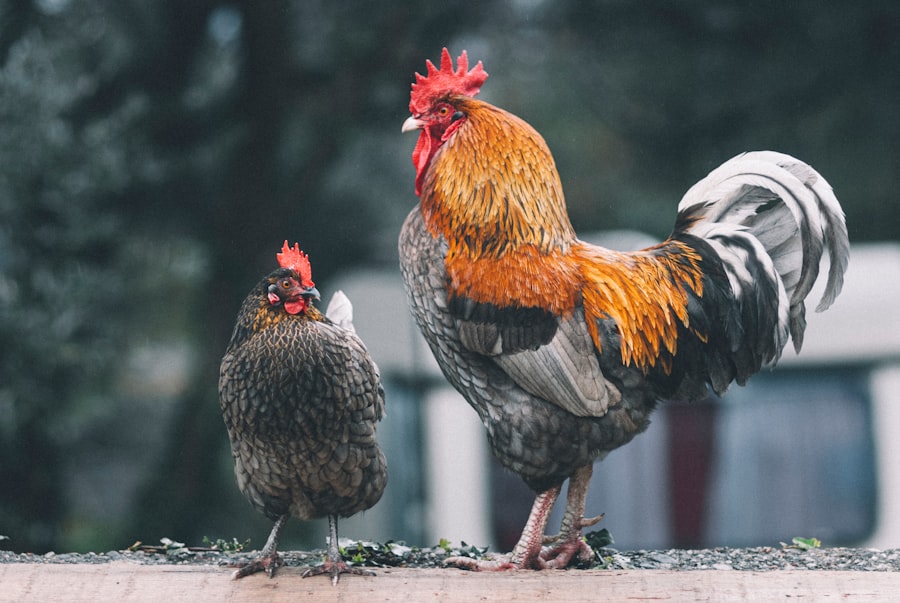Keeping chickens at home has become a growing trend in recent years, as more and more people are realizing the benefits of raising their own chickens. Not only does it provide a sustainable source of fresh eggs, but it also offers a unique and rewarding experience. Whether you live in a rural area or an urban setting, keeping chickens at home is a feasible option that can be enjoyed by people of all ages.
The benefits of raising chickens at home are numerous. First and foremost, it is an environmentally friendly practice. Chickens are natural recyclers, as they eat kitchen scraps and turn them into nutrient-rich manure for your garden. By keeping chickens, you are reducing waste and contributing to a more sustainable lifestyle.
In addition to the environmental benefits, there are also health benefits to consuming fresh eggs from your own chickens. Fresh eggs are higher in nutrients compared to store-bought eggs, as they are not subjected to long periods of storage and transportation. They are also free from antibiotics and hormones that are commonly used in commercial egg production.
Furthermore, raising chickens at home can lead to significant cost savings. The cost of purchasing eggs from the grocery store can add up over time, especially if you consume them regularly. By producing your own eggs, you can save money in the long run and have the satisfaction of knowing exactly where your food comes from.
Key Takeaways
- Keeping chickens at home has become increasingly popular in recent years.
- Raising chickens in your backyard can provide numerous benefits, including fresh eggs and natural pest control.
- Choosing the right breed of chicken for your home depends on factors such as egg production and temperament.
- Building a chicken coop requires careful planning and attention to detail, but can be a rewarding DIY project.
- Feeding your chickens a balanced diet and keeping their living space clean and well-maintained are key to preventing common diseases and keeping your flock healthy.
Benefits of Raising Chickens in Your Backyard
One of the main benefits of raising chickens in your backyard is the positive impact it has on the environment. Chickens are natural pest controllers, as they eat insects and other pests that can damage your garden. By allowing chickens to roam freely in your backyard, you can reduce the need for chemical pesticides and create a more balanced ecosystem.
Another benefit of backyard chicken keeping is the health benefits associated with consuming fresh eggs. Fresh eggs are higher in nutrients compared to store-bought eggs, as they are not subjected to long periods of storage and transportation. They are also free from antibiotics and hormones that are commonly used in commercial egg production. By consuming fresh eggs from your own chickens, you can ensure that you are getting the highest quality eggs possible.
In addition to the environmental and health benefits, raising chickens in your backyard can also lead to significant cost savings. The cost of purchasing eggs from the grocery store can add up over time, especially if you consume them regularly. By producing your own eggs, you can save money in the long run and have the satisfaction of knowing exactly where your food comes from.
Choosing the Right Breed of Chicken for Your Home
When it comes to choosing the right breed of chicken for your home, there are several factors to consider. Different breeds have different characteristics and requirements, so it is important to choose a breed that suits your needs and lifestyle.
There are many different breeds of chickens to choose from, each with its own unique set of characteristics. Some breeds are known for their egg-laying abilities, while others are prized for their meat or ornamental qualities. It is important to research different breeds and determine which ones will best meet your needs.
When selecting a breed of chicken, it is important to consider factors such as climate, space requirements, and temperament. Some breeds are better suited for cold climates, while others thrive in warmer environments. Similarly, some breeds require more space to roam and forage, while others can be kept in smaller enclosures.
It is also important to consider the temperament of the breed. Some breeds are known for being docile and friendly, while others can be more aggressive or flighty. If you have children or other pets, it is important to choose a breed that is known for being good with them.
Building a Chicken Coop: A Step-by-Step Guide
Building a chicken coop is an essential part of keeping chickens at home. A chicken coop provides a safe and secure environment for your chickens to live and lay eggs. It also helps to protect them from predators and the elements.
When building a chicken coop, it is important to consider the size and layout of the coop. The size of the coop will depend on the number of chickens you plan to keep. As a general rule of thumb, each chicken should have at least 4 square feet of space inside the coop and 10 square feet of space in the outdoor run.
The layout of the coop should include nesting boxes for the chickens to lay their eggs, roosting bars for them to sleep on, and a secure door to keep predators out. It is also important to provide adequate ventilation and lighting in the coop.
When it comes to materials, there are several options to choose from. Wood is a popular choice for building chicken coops, as it is durable and provides good insulation. Other materials such as metal or plastic can also be used, depending on your preferences and budget.
Feeding Your Chickens: What to Give and What to Avoid
Feeding your chickens a balanced diet is essential for their health and well-being. Chickens require a variety of nutrients to thrive, including protein, carbohydrates, fats, vitamins, and minerals.
A good quality commercial chicken feed is a great starting point for feeding your chickens. Look for a feed that is specifically formulated for laying hens, as it will contain the necessary nutrients for egg production. You can also supplement their diet with kitchen scraps, fruits, vegetables, and grains.
In addition to commercial feed and kitchen scraps, there are several other foods that are safe for chickens to eat. These include insects, worms, seeds, grass, and weeds. It is important to provide a balanced diet that includes a variety of foods to ensure that your chickens are getting all the nutrients they need.
There are also some foods that should be avoided when feeding chickens. These include chocolate, caffeine, avocado, onions, garlic, and raw potatoes. These foods can be toxic to chickens and should never be fed to them.
Keeping Your Chickens Healthy: Common Diseases and How to Prevent Them

Keeping your chickens healthy is essential for their well-being and productivity. Chickens are susceptible to a variety of diseases, some of which can be fatal if left untreated. It is important to be aware of the common diseases that affect chickens and take steps to prevent them.
One of the most common diseases that affect chickens is called coccidiosis. This is a parasitic disease that affects the intestines of chickens and can cause diarrhea, weight loss, and even death. It is important to keep the coop clean and dry to prevent the spread of coccidiosis.
Another common disease that affects chickens is called avian influenza, or bird flu. This is a viral disease that can cause respiratory problems, diarrhea, and death in chickens. It is important to practice good biosecurity measures to prevent the spread of avian influenza.
Regular check-ups and vaccinations are also important for keeping your chickens healthy. A veterinarian can provide vaccinations for common diseases such as Newcastle disease and infectious bronchitis. They can also provide advice on how to prevent and treat other common diseases.
Collecting and Using Chicken Eggs: Tips and Tricks
Collecting chicken eggs is one of the most rewarding aspects of keeping chickens at home. There are several best practices to follow when collecting eggs to ensure their freshness and safety.
First and foremost, it is important to collect eggs regularly. Leaving eggs in the nest for too long can lead to spoilage or breakage. Aim to collect eggs at least once a day, preferably in the morning when they are still fresh.
When collecting eggs, it is important to handle them with care. Use clean hands or gloves to prevent the transfer of bacteria. Avoid washing eggs unless absolutely necessary, as this can remove the protective coating and increase the risk of contamination.
Storing eggs properly is also important for maintaining their freshness. Eggs should be stored in a cool, dry place away from direct sunlight. They should be stored with the pointed end down to help preserve their quality.
When it comes to using chicken eggs, there are endless possibilities. Fresh eggs can be used in a variety of recipes, from omelettes and quiches to cakes and cookies. They can also be boiled, poached, or fried for a quick and nutritious meal.
Chicken Behavior: Understanding and Dealing with Aggression
Understanding chicken behavior is essential for keeping a happy and healthy flock. Chickens have a social hierarchy, with one or more dominant birds at the top of the pecking order. It is important to understand this hierarchy and provide a stress-free environment for your chickens.
Aggression is a common behavior in chickens, especially when introducing new birds to an existing flock. It is important to monitor the behavior of your chickens and intervene if necessary. If aggression becomes excessive or violent, it may be necessary to separate the birds or rehome them.
There are several strategies for dealing with aggressive chickens. One approach is to provide plenty of space and resources for the chickens to reduce competition and aggression. This includes providing multiple feeding and watering stations, as well as plenty of roosting space.
Another strategy is to distract aggressive chickens with treats or toys. This can help redirect their attention and reduce aggression towards other birds. It is also important to provide plenty of hiding places and escape routes for subordinate birds to avoid confrontations.
Integrating New Chickens into Your Flock
Integrating new chickens into an existing flock can be a challenging process, but with proper planning and patience, it can be successful. It is important to take the time to introduce new chickens slowly and monitor their behavior during the integration process.
The first step in integrating new chickens is to quarantine them for a period of time. This helps to prevent the spread of diseases and allows the new chickens to adjust to their new environment. Quarantine should last for at least two weeks, during which time the new chickens should be kept separate from the existing flock.
Once the quarantine period is over, it is time to introduce the new chickens to the existing flock. This should be done gradually, starting with short supervised visits and gradually increasing the amount of time they spend together. It is important to monitor the behavior of the chickens during these visits and intervene if necessary.
During the integration process, it is important to provide plenty of space and resources for the chickens. This includes providing multiple feeding and watering stations, as well as plenty of roosting space. It is also important to provide hiding places and escape routes for subordinate birds to avoid confrontations.
Enjoying the Rewards of Keeping Chickens at Home
Keeping chickens at home offers a wide range of benefits, from environmental sustainability to cost savings and health benefits. By raising your own chickens, you can enjoy fresh eggs that are higher in nutrients compared to store-bought eggs. You can also reduce waste and contribute to a more sustainable lifestyle by recycling kitchen scraps through your chickens.
Choosing the right breed of chicken for your home is an important decision that should be based on your needs and lifestyle. Different breeds have different characteristics and requirements, so it is important to do your research and choose a breed that suits you.
Building a chicken coop is an essential part of keeping chickens at home. A well-designed coop provides a safe and secure environment for your chickens to live and lay eggs. It also helps to protect them from predators and the elements.
Feeding your chickens a balanced diet is essential for their health and well-being. A good quality commercial chicken feed is a great starting point, but it should be supplemented with kitchen scraps and other foods to provide a varied diet.
Keeping your chickens healthy is essential for their well-being and productivity. Regular check-ups and vaccinations are important, as well as practicing good biosecurity measures to prevent the spread of diseases.
Collecting and using chicken eggs is one of the most rewarding aspects of keeping chickens at home. Following best practices for collecting and storing eggs will ensure their freshness and safety.
Understanding chicken behavior is important for maintaining a harmonious flock. Dealing with aggression and providing a stress-free environment are key to keeping your chickens happy and healthy.
Integrating new chickens into an existing flock can be challenging, but with proper planning and patience, it can be successful. Taking the time to introduce new chickens slowly and monitor their behavior during the integration process is important.
In conclusion, keeping chickens at home offers a unique and rewarding experience. It provides a sustainable source of fresh eggs, reduces waste, and contributes to a more sustainable lifestyle. By choosing the right breed of chicken, building a well-designed coop, providing a balanced diet, and practicing good biosecurity measures, you can enjoy the rewards of keeping chickens at home.
If you’re interested in keeping chickens at home, you’ll definitely want to check out this informative article on chicken coops in Muskegon. It provides valuable insights and tips on creating a safe and comfortable environment for your feathered friends. Whether you’re a beginner or an experienced chicken keeper, this article offers practical advice on choosing the right coop and ensuring the well-being of your chickens. For more information, visit https://poultrywizard.com/keeping-chickens/chicken-coop-muskegon/.
FAQs
What are some good books on keeping chickens at home?
There are several good books on keeping chickens at home, including “The Chicken Chick’s Guide to Backyard Chickens” by Kathy Shea Mormino, “Storey’s Guide to Raising Chickens” by Gail Damerow, and “Fresh Eggs Daily” by Lisa Steele.
What information can I expect to find in these books?
These books cover a range of topics related to keeping chickens at home, including choosing the right breed, building a coop, feeding and caring for chickens, and dealing with common health issues.
Are these books suitable for beginners?
Yes, these books are suitable for beginners and provide a wealth of information for those new to keeping chickens at home.
Can I find these books online?
Yes, these books are available for purchase online through retailers such as Amazon and Barnes & Noble.
Are there any other resources available for those interested in keeping chickens at home?
Yes, there are many online resources available, including forums and websites dedicated to backyard chicken keeping. Local agricultural extension offices and poultry associations may also offer workshops and classes on the topic.
Meet Walter, the feathered-friend fanatic of Florida! Nestled in the sunshine state, Walter struts through life with his feathered companions, clucking his way to happiness. With a coop that’s fancier than a five-star hotel, he’s the Don Juan of the chicken world. When he’s not teaching his hens to do the cha-cha, you’ll find him in a heated debate with his prized rooster, Sir Clucks-a-Lot. Walter’s poultry passion is no yolk; he’s the sunny-side-up guy you never knew you needed in your flock of friends!







